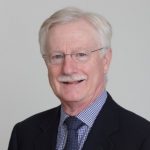The Executive Committee of the Center is pleased to announce the CCN Distinguished Speaker Series. The goal of this speaker series is to invite high profile speakers to the SDSU campus to provide both public lectures and lectures that highlight new discoveries and cutting-edge research in cognitive neuroscience.
Up Next – Dr. Robert T. Knight, M.D.!
The CCN Executive Committee invites you to a lecture by Dr. Robert T. Knight:
 Dr. Robert T. Knight |
“Frontal Cortex and Human Behavior: Insights from Intracranial Recording” Professor of Neuroscience and Psychology Friday, February 10, 2017 |
Abstract:
Neuropsychological evidence documents the critical role of prefrontal cortex (PFC) in goaldirected behavior. Intracranial recording provides unique insights in the role of PFC in human cognition. Neurophysiological dogma classically stated that the human cortex did not generate reliable rhythms above 50 Hz. However, findings over the last decade from intracranial recording report neural activity up to 250 Hz in the human cortex in every cognitive process examined (70- 250 Hz, high frequency band; HFB). Importantly, HFB activity has superb spatial localization and task specificity and provides an index of local cortical activation. HFB recording has provided novel insights into language processing, decision making, social cognition, motor control, sensory perception and memory. Importantly, HFB activity is also phase locked to the trough of slower cortical oscillations (theta band 4-8 Hz) with different PFC dependent tasks eliciting unique spatial patterns of HFB-theta inter-frequency coupling. This transient coupling between low- and high-frequency brain activity provides a powerful mechanism for integration and communication in distributed neural networks engaged during PFC dependent cognitive processing. The results obtained from intracranial recording support the proposal that the devastating human frontal syndrome can be viewed as a failure of the PFC control of distributed neural networks subserving human behavior.
Previous Speakers

Dr. George Koob
Dr. George Koob
Director of the National Institute of Alcohol Abuse and Alcoholism
“Neurobiology of addiction: A stress surfeit disorder”
April 22, 2106

Bradley Schlaggar
Dr. Bradley Schlaggar
A. Ernest and Jane G. Stein Professor of Developmental Neurology
Professor of Radiology, Pediatrics, and Anatomy & Neurobiology
“Investigating the Development of the Brain’s Functional Network Architecture”
January 30, 2015

Vinod Menon
Dr. Vinod Menon
Professor, Psychiatry & Behavioral Science
Child and Adolescent Psychiatry
Stanford University School of Medicine
“Functional and structural brain organization in autism: Linking physiology and behavior”
December 5, 2014

Katrin Amunts (© Deutscher Ethikrat; photo by Reiner Zensen)
Dr. Katrin Amunts
Director, Institute for Neuroscience and Medicine
Structural and Functional Organization of the Brain
Jülich Research Center, Germany
Director, Cecile and Oscar Vogt Institute of Brain Research
University Hospital, University of Düsseldorf
“Mapping Language Regions: Concepts, Tools and Perspectives”
October 29, 2014

Recent Comments